Single dads often wonder if dating a childless woman can really work, or if it brings too many challenges. Studies show single dads get 22% more first messages on dating sites compared to men without kids.
This blog will break down single dad dating childless woman, showing you real-life struggles and the honest rewards of making it work. Get ready for advice that changes how you view long-term relationships with someone who chose not to have children.
Key Takeaways
Single dads get 22% more first messages on dating sites than men without kids (study cited in article). This shows many women are open to dating fathers, even if they do not have children themselves.
Balancing parenting and romance is hard. Using calendar apps like Google Calendar or Cozi helps manage busy custody schedules and plan time for both the child and partner. Open talks about plans, priorities, and boundaries are key.
Relationship challenges include differences in daily routines, future family goals, and views on parenting. Respect for the child’s mother and honest communication with all adults avoids drama and supports harmony.
Building trust takes patience—John McElhenney suggests waiting at least six months before introducing kids to a new partner. Taking things slow helps everyone adjust without stress.
Rewards of these relationships include emotional maturity, stronger empathy, meaningful bonds, and chances to create blended families with fun traditions like game nights or shared dinners over time. Both partners can grow by facing tough spots together with kindness and respect.
Table of Contents
Dynamics of a Single Dad Dating a Childless Woman

A single father and a woman without children often see things from different viewpoints, especially about parenting responsibilities and daily routines. Their relationship grows stronger as they learn to balance the needs of children with their own dating expectations.
What unique challenges does this relationship face?

Differences in life experience and daily routines can create tension for a single parent dating someone who chooses to be childless on a Ukraine dating site. Balancing parenting responsibilities with new romantic interests often feels like a juggling act, especially as custody schedules shift each week.
Some dads may face rivalry between their new partner and their children or experience pushback from the child’s mother. John McElhenney suggests waiting at least six months before introducing kids, highlighting how timing matters when building trust.
Dating expectations also vary; emotional maturity built by fatherhood may clash with the independence valued by those who are childfree. Future plans, such as having more children or blending families, bring tough topics to light early on.
Adjusting to different parenting perspectives is common since not everyone shares the same approach or attitude toward rules and family time.
Patience and clear communication set the tone for any real connection.
This tug-of-war between attachments helps explain why some men look outside traditional channels—like trying out a Ukraine dating site—to meet women more open to blended family life or casual dating options.
Next up: What rewards and sources of fulfillment come from these relationships?
What are the potential rewards and sources of fulfillment?

Dating as a single dad can bring deep rewards. You learn patience from balancing your children’s needs with new love. A childless woman dating a father might feel joy as shared activities build sweet, blended families and real connections take shape over time.
Meeting the kids is a big sign that trust exists; it shows he values the relationship genuinely, not just for short-term hookups or fun after divorce.
With emotional maturity on both sides, you often create a peaceful home life even if teenagers or an ex-partner are in the picture. Kindness and respect between everyone help avoid messy breakups and make family gatherings more enjoyable for all.
Some single dads I know say their partners grew in understanding and empathy by taking on this role; they felt real purpose supporting each other through tough spots or learning how to talk about boundaries without drama.
If either of you ever feels unsure about the next steps in blended families or online dating, resources like this article on what a matchmaker is can provide valuable insights before you make decisions together.
Now let’s look at some specific challenges you may face along the way.
Common Challenges Faced

Single dads and child free women each bring their own experiences and needs to the table, which can make relationships both exciting and tricky. Respect for relationship boundaries and open talks about parenting styles often set the tone—especially after divorce or when choosing to be childless.
How can single dads balance parenting and dating?
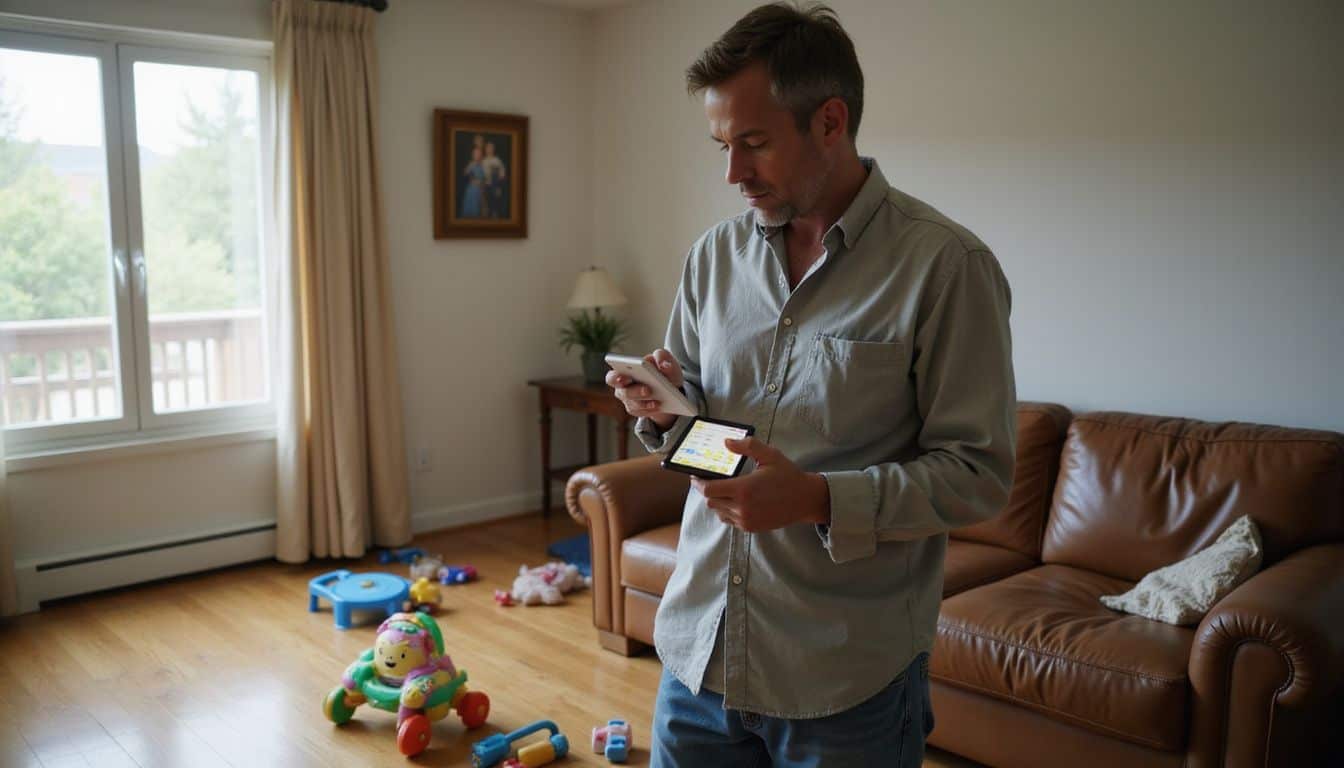
Rob Rohde, a single father of five daughters, knows that balancing parenting and dating after divorce takes careful planning. Structured schedules help keep things steady for kids and leave space for new relationships.
Many fathers use calendars or phone reminders to manage custody swaps, school events, and time with their partner. Dating someone child free can come with its own challenges since they may not understand why kids always come first.
Open talks about expectations are key. Fathers often chat with both their children and the person they date about boundaries and priorities in the relationship. Flexibility matters too; plans may change if a child gets sick or needs attention.
As Rob shares, ‘You learn quickly how to plan ahead while also rolling with surprises.’ For creative ideas on making dates special when time is tight, check out this article on what people do on a blind date.
Parenting schedules never sleep… sometimes you need patience from everyone involved.
How to navigate custody schedules effectively?

Managing a custody schedule can be tough, especially if you choose to be childless and date a single dad. The right steps can help create more balance and less stress for everyone.
- Always keep a clear schedule, using family calendar apps like Google Calendar or Cozi. These tools make planning easier for both dads and partners.
- Share updates about changes as early as possible. A mix of phone calls and texts works best for urgent matters.
- Use technology to sync with your co-parent’s plans, so double-booking events or forgetting key dates is less likely.
- Write down all court-ordered holidays, visits, sports games, or school meetings in one place; color-code events that involve the child’s mother for quick reference.
- Build some flexibility into your week because last-minute things often come up with kids or co-parents; rigid routines rarely hold up long.
- Talk openly with both your partner and the child’s mother about plans; calm, respectful chat helps stop conflicts before they start.
- Take time to understand the other parent’s needs without trying to replace mothers in the family unit; this creates mutual respect and smoother handovers.
- Track how much time goes to parenting versus dating each month; honest review helps spot stress points quickly.
- Expect time crunches around holidays or school breaks; try switching date nights around custody swaps so no one feels left out.
- Cooperate on pickups and drop-offs by sharing maps or real-time GPS locations through messaging apps like WhatsApp for safe transitions.
- Prepare backup options if weather or illness cancels a visit—calling on friends or relatives keeps kids cared for while showing responsibility.
From my experience as a single dad using online tools since 2021, teamwork between adults makes custody schedules work better every day—even when life throws curveballs at you both.
How to manage the presence of the child’s mother?

Co-parenting means the child’s mother will be part of your partner’s life. Show respect for her role, even if you do not see eye to eye. Open and honest talks about boundaries and expectations help avoid drama.
Speak with your partner about how much contact is needed or expected with his ex. This keeps things clear, so no one feels surprised or threatened.
Let things grow at a comfortable pace for everyone involved. Support your partner in keeping healthy co-parent communication focused on the child’s needs, not past issues. Stay patient as relationships change over time — patience pays off here.
I learned this first-hand; acting as a positive adult in the child’s world built trust step by step, without stepping on anyone’s toes or trying to take their mother’s place.
If invited to meet the children, make sure both parents agree it is right for their family before you jump in.
What differences in parenting perspectives might arise?

Single dads often follow routines shaped by custody agreements, school schedules, and their child’s emotional needs. Childless women may see parenting as more flexible or spontaneous.
This difference can lead to mixed feelings about rules at home. Single fathers might stress the need for structure—for example, set bedtimes or doing homework before fun activities—while a woman new to parenting could focus on play first or feel less strict about routines.
I’ve seen that expectations for roles also shift in these relationships. Fathers who receive extra support from family or friends sometimes expect shared responsibility right away; childless partners may want to move slower since everything feels so new.
Past experiences and habits make every person different—a dad shaped by past co-parenting with an ex might be cautious about discipline approaches or how much say his partner gets in raising his kid.
Tension happens if each person has strong views on what is “right.” Clear talks help bridge those gaps and prevent small issues from growing bigger than they should be.
Major Rewards of the Relationship

You gain real partnership, learn new patience, and grow closer through honest support—check out the benefits waiting for you.
How does emotional maturity benefit the relationship?

Emotional maturity brings patience, understanding, and empathy into a relationship. It helps both partners resolve fights and see past small problems. For example, if Dad needs to cancel a date for his child’s emergency, the woman can stay calm and not feel left out.
“Empathy is seeing with the eyes of another, listening with the ears of another, and feeling with the heart of another.”
This level of growth shows in tough times. People who reflect on their actions often spot where they need to improve. A man who thanks his partner for supporting him during stress builds deeper trust.
Over time these habits help couples get through hard days together—making love last even longer.
How to build a meaningful connection with a single dad?
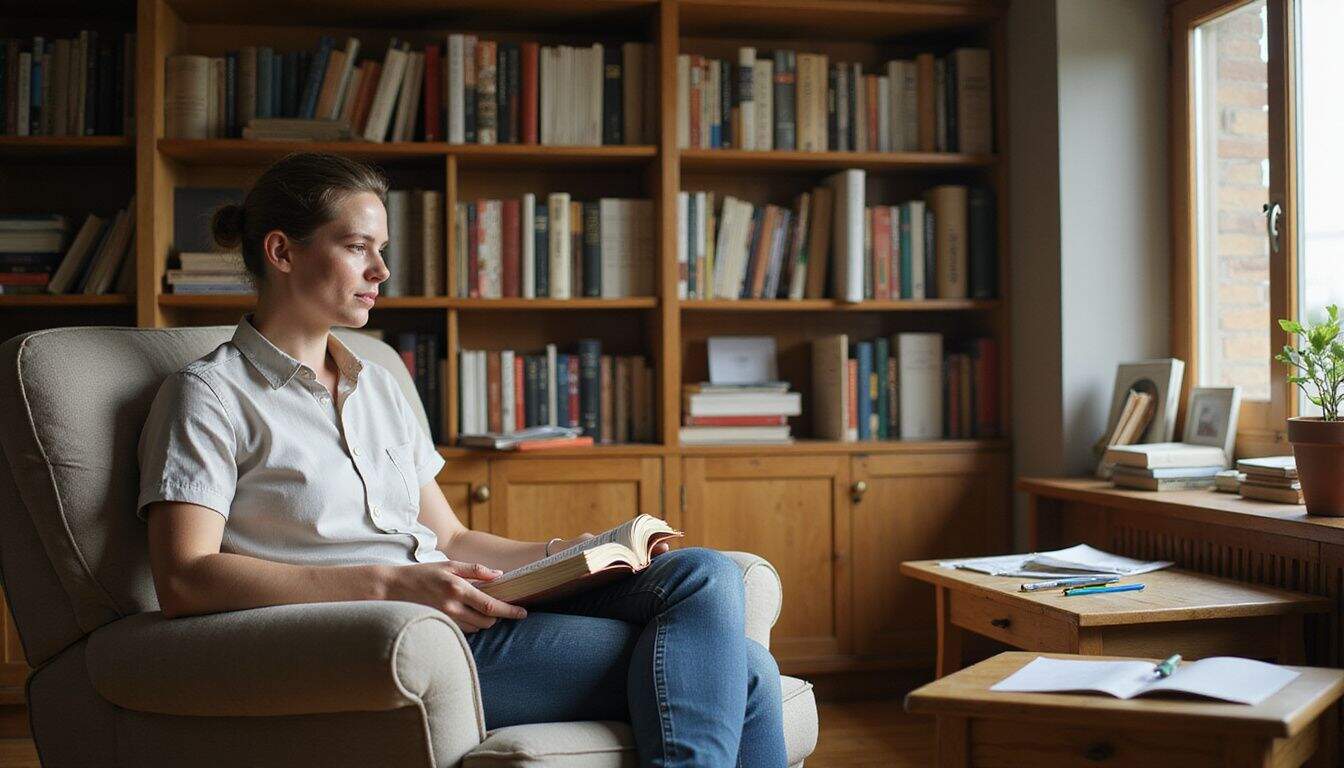
Emotional maturity lays the foundation for honest conversations. To build a meaningful connection with a single dad, stay patient and open. Many single dads prioritize their children’s needs first, so respect his time and commitments.
Build trust through small steps, like supporting his parenting decisions or asking about his child’s interests.
Share your intentions openly right from the start to avoid confusion later on. Make time for simple but real talks instead of just texting back and forth; strong communication deepens bonds quickly.
Being flexible helps too—his schedule might shift fast based on kids’ needs or custody changes.
Use daily tools like video calls if meeting in person is tough this week or suggest planning outings that involve both him and his child over weekends. Focus attention on him and also show patience for the family life he values most.
A stable foundation grows from understanding, respect, and shared moments; those are key for building something that lasts with any single parent today.
What opportunities exist to embrace a blended family?
Blended families thrive with time, effort, and a lot of patience. In my own experience as a single dad, simple things like weekly dinners and family game nights helped us build trust step by step.
Stepparents can take on roles like mentors or friends instead of forcing themselves into traditional parent spots. This flexible approach keeps stress low for kids and adults alike.
Open talks make all the difference. Family meetings or casual chats give everyone space to share thoughts and feel heard. Couples should also focus on their bond; strong relationships set the tone at home.
A supportive home grows from these small daily actions—everyone feels seen, valued, and safe enough to grow together in this new structure. Next up is how empathy and patience open doors for personal growth in both partners.
How can empathy and patience foster personal growth?
Empathy helps you see your partner’s side, especially during tough talks or custody clashes. Single dads and childless women both bring different feelings to the table. Taking time to listen and share these feelings can make bonds stronger and teach patience.
Acknowledging each other’s struggles often leads to emotional maturity, which comes in handy during conflict resolution.
Patience lets you step back instead of rushing into judgment or snapping at a problem. Over time, I’ve learned small pauses before reacting help everyone feel heard—kids included.
Using empathy builds trust with both your partner and their children, while patience brings lasting calm even on stressful days. Practicing these skills means personal growth shows up not just as a better parent or partner but as a more grounded person overall.
Empathy is about finding echoes of another person in yourself.
Communication Tips for Success

Clear communication builds trust between you and your partner, especially when discussing parenting tools like co-parenting apps or shared calendars. Setting honest guidelines early can prevent mix-ups and help everyone feel respected—keeping both hearts and schedules in sync.
How to set clear expectations early in the relationship?
Honest talks help everyone know what to expect from the start. Share your needs and listen to her hopes as well. Use real examples, like planning around school events or deciding how often you’ll meet up each week.
Discuss custody schedules early, so there’s less confusion later. Open conversations make teamwork easier and keep both sides comfortable with choices.
Talk about things that matter most—parenting time, family boundaries, visits with your child’s mother, even personal downtime for yourself. Respect makes trust grow over time; patience also helps it last longer.
If disagreements come up or if the situation feels tough, a therapist can offer support and new ideas for working things out as a couple.
Next comes figuring out how to discuss boundaries and priorities in ways that make sense to both partners.
How to discuss boundaries and priorities effectively?
State your needs and limits early. Say, “I need alone time with my kids on weekends,” or, “Let’s plan date nights around my custody schedule.” Use clear words so both people know what matters most.
Validate children’s feelings too; say things like, “It’s okay to feel unsure about changes.” This builds trust and eases adjustments as you start dating.
Reflect on your own past experiences to guide the talk. If issues come up, use open communication—text messages can help for quick check-ins while in-person talks work better for deeper topics.
A family therapist can support hard conversations if needed. Next up: how to address concerns openly and constructively without creating tension.
How to address concerns openly and constructively?
After setting clear boundaries and priorities, it’s vital to keep communication honest. Share your concerns early; use simple words and plain facts. For example, if you feel left out during parenting time, say so clearly.
Avoid hints or sarcasm. Honest talk helps avoid confusion and builds trust.
Use supportive dialogue rather than blaming language. Listen first before you reply; show patience even if the topic is sensitive. It helps to check in regularly about how each of you feels regarding shared experiences or changes in schedules.
As a single dad dating a childless woman myself, I found starting these talks with small issues made it easier later when bigger topics came up—like balancing family time with date nights or respecting the presence of my child’s mother during important events.
This direct approach keeps things on track for everyone involved: dad, partner, and child alike.
Adapting to Life with a Single Dad
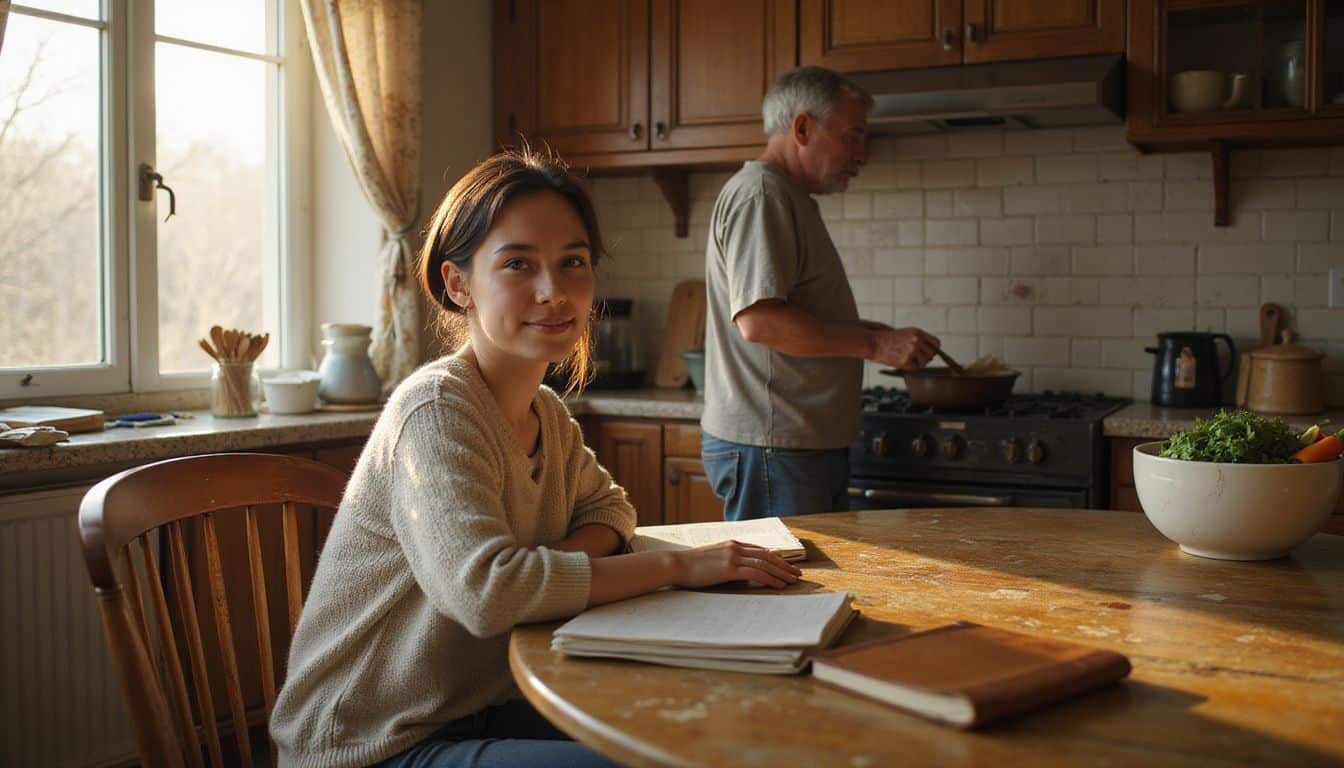
Life with a single dad often means understanding his tight schedule, respecting the bond he shares with his kid, and finding your own rhythm—keep reading to see how it all fits together.
Why is understanding the priority of children important?
Single dads put their children first. This is not just a rule; it is part of daily life. Kids need safety, love, and attention before anything else. Planning dates often has to fit around school nights, homework, and sports games.
A dad might cancel plans at the last minute if his child needs him or if something changes with custody schedules.
From my own experience dating as a single father since 2022, I learned fast that patience helps both partners feel more comfortable. The woman I dated respected this priority from day one.
She understood that caring for my son came before romantic dinners or weekend getaways together. Building trust starts here: seeing the kids’ well-being as part of your commitment makes any relationship stronger over time.
Kids do not wait; they count on their parent each day—and anyone dating a single dad should respect how vital this bond is for healthy relationships all around.
How to respect the co-parenting relationship?
Show respect for the child’s mother by supporting her role as a parent, no matter your personal feelings. Encourage open communication between all adults involved. In my own experience, staying civil during drop-offs helped everyone feel more comfortable.
Speak positively about the other parent in front of the child to create trust and stability.
Be honest about boundaries and parenting roles with your partner early on. Share updates about important events or changes that may affect schedules; this builds mutual support and avoids surprises.
Building a strong support network helps—you can learn from others who have managed joint custody or co-parenting plans before you. Approach each situation with fairness, patience, and clear words for better results every time.
How to find balance between dating and family time?
Set clear plans for both your family and dating life. Use a calendar app, like Google Calendar or Cozi, to mark custody schedules and special events. Block out days just for your child, without distractions.
Choose one night each week for dates or personal time, so you stay present as a parent but also invest in your relationship.
Talk openly with your partner about your role as a father and why family comes first most times. Take things slow before introducing partners to children; this lowers stress for everyone involved.
Make self-care part of the routine to help manage stress from being both single dad and boyfriend. Seek out women who appreciate fatherhood—plenty of single dads use online dating sites built for parents, such as SingleParentMatch or eHarmony’s specific filters.
Focus on small steps that respect both parts of your life—you’ll find better balance over time.
Building a Relationship with the Child

Connecting with his child takes patience, kindness, and time—don’t rush it. Finding your place in the family grows from honest actions and gentle trust-building.
How to take time to develop trust with the child?
Start slow. Trust takes time, especially for kids meeting someone new in their dad’s life. Spend quality time together, like joining in simple hobbies or playing at the park. Make these moments regular but not forced.
For example, set up a weekly board game night or go out for ice cream after school.
Always respect the child’s space and feelings by letting them take the lead on conversations or activities. Do not try to step into any role too fast—just be yourself and show you care through small, steady actions.
Patience matters; experts say consistent presence helps children feel secure over months rather than days or weeks. If your child shares something personal, listen carefully and keep it private—to build trust, keep promises just as you would with an adult friend.
Taking part in shared experiences like short road trips or learning a new skill together can help form memories and comfort faster than big changes do. Use open communication so they know you are there for both fun times and tough days, without pressure to bond right away.
Over time, this patience and consistency create real trust that lasts—even if things start slow at first.
What is your role in the child’s life?
Kids need a stable, supportive adult around. Your main job is to show respect for the child and their bond with both parents. Think of yourself more as a mentor or friend. Do not try to step into the shoes of their mother or act like a replacement parent.
I found that kids often warm up over time if you engage in positive activities together, from playing basketball at the park to helping with school projects.
Encourage honest chats, but also listen when they want space—kids value privacy too. Support their routine and family structure; this helps them feel safe during new changes. By fostering good communication and showing patience, you help build trust little by little.
This type of care shapes a nurturing home life for everyone involved, leading right into how to respect the co-parenting relationship moving forward.
Why should you avoid trying to replace their mother?
Kids need stability, especially after major changes like divorce or separation. Trying to take the place of their mother can lead to confusion and emotional harm. Children may feel torn between two worlds if you act as a substitute mom rather than someone who supports their family structure.
In my experience, kids respond better when they know you respect both parents’ roles.
Forming bonds too quickly can hurt more if things do not work out. Experts say that introducing many partners causes stress for children; long-term research shows it leads to trust issues later in life.
Instead of stepping into her shoes, offer support and kindness while making sure the child knows their mother remains vital in their life. Respect for co-parenting is key; this helps create emotional safety and security at home, which every child deserves.
Navigating Co-Parenting Dynamics
Co-parenting brings a mix of real emotions and new ground rules—especially if you’re building trust with both your partner and her child’s mother. Finding respectful ways to share updates, set routines, and use apps like TalkingParents can help keep things smoother for everyone involved.
How to maintain respect for the child’s mother?
Speak respectfully about the child’s mother at all times, especially in front of your child. No matter what happened between you and her, keep personal details private. Kids need stability; hearing criticism or harsh words causes stress and confusion for them.
I saw this firsthand with my own son—he felt torn when he heard anything negative about his mom.
Show support for the co-parenting relationship by using tools like shared calendars such as Google Calendar to coordinate parenting time smoothly. Open communication helps avoid misunderstandings and keeps things transparent for everyone involved.
When disagreements arise with the child’s mother, handle them calmly and away from your partner or children to protect their emotional well-being. Treat her role seriously because she is a major part of your child’s world.
Focusing on respect makes it easier to find a healthy way to talk with each other as parents, which leads right into discussing cooperative communication strategies next.
How to find a cooperative communication approach?
Start by setting up regular meetings with the child’s mother. These meetings help everyone share updates and solve small problems early. Keep a shared parenting plan, so each person knows what to expect.
Respectful conversations and open minds make things much easier for both sides.
Focus on your child’s needs first, not just your own feelings or wants. Use tools like family calendars or simple apps to keep schedules clear. Practice empathy during tough talks; try to see things from the other parent’s view before you respond.
Pay attention to how you talk—your words matter as much as your tone does.
Managing these steps helps avoid problems later, making room for understanding and respect between everyone involved. Next comes handling conflict in co-parenting without letting it get out of hand.
How to avoid unnecessary conflicts in co-parenting?
Finding a cooperative communication approach lays the groundwork for smoother co-parenting. Clear phone or in-person talks help stop misunderstandings before they grow into bigger issues.
It helps to agree on ground rules early, such as sticking with set child exchange times and keeping updates simple but honest.
Conflicts often start when boundaries blur or emotions run high. Use shared digital calendars, like Google Calendar, to keep track of custody schedules and important dates so nothing falls through the cracks.
Put your child’s needs above personal feelings—kids feel secure if both parents show respect for each other’s roles, even after separating. Consistency matters: agreeing on similar house rules can prevent confusion for your kids and reduce tension between adults.
Respect builds trust, while patience buys time for everyone to adjust without starting unnecessary fights.
Ensuring the Relationship Meets Your Needs

Check in with yourself often, use open communication apps like WhatsApp or Signal to talk about feelings, and see how happy you feel—curious about finding your own balance with a single dad? Keep reading.
How to evaluate your own emotional well-being?
Start by asking yourself simple questions about your emotions and needs. How do you cope with stress, handle jealousy, or balance work and relationships? The free Emotional Needs Questionnaire can help men find quick answers in just 2 to 5 minutes.
It pinpoints five main emotional profiles with clear tips for managing your feelings better. Use this tool to spot what lifts you up or brings you down in dating as a single dad.
Self-reflection sharpens your self-awareness. Notice how often you feel happy, anxious, or supported around a childless partner. Think about the times parenting clashes with dating priorities or if frustration creeps up when co-parenting gets tough.
Knowing these patterns helps you decide if this single dad lifestyle fits your real needs and values—and leads right into checking if compatibility issues might arise next.
How to assess compatibility with a single dad’s lifestyle?
After looking at your emotional well-being, turn your attention to daily life and routines. Kids always come first for single dads; this priority shapes everything from plans on weekends to last-minute changes in the middle of the week.
You may feel the structured schedules leave less time for dates or quiet nights together. Try spending some evenings or weekends with him and his kids. Notice how you feel about family meals, homework help, Netflix nights, and school runs.
Talking openly helps both sides understand each other’s values and hopes for the future. Share what you want—a quiet house? Active social life? Time alone? Be honest about limits too; maybe work hours are fixed or social needs differ.
My own experience showed that unexpected calls from a child’s teacher or sudden need for a “dad taxi” can change plans fast—so flexibility is gold here. If you find joy building connections with children and respect shared parenting boundaries—this setup might fit your lifestyle well.
Tips for Long-Term Success

Long-term success means giving space for growth, practicing patience with changes, and talking openly—discover more strategies that can help your relationship thrive.
How to allow the relationship to evolve naturally?
Take your time and avoid rushing. Let each day together show you how things feel, instead of pressing for answers too soon. Set clear expectations early to help both people relax and be themselves.
Share your thoughts, even if they are simple or unsure, so your partner knows where you stand.
Stay open to change as life shifts around you; flexibility builds trust and comfort in the relationship. Give space for both partners to grow alone and together. My own experience taught me that staying patient, not forcing milestones or labels, allows love to build on its own timeline.
Every honest talk brings deeper understanding without strain or pressure—just two people learning what works best for them.
Why is embracing flexibility and patience important?
Flexibility helps single dads manage different schedules, including work, kids’ activities, and dating. Sometimes plans change fast because a child gets sick or the other parent needs to swap custody days.
Patience gives everyone time to adjust and grow into new routines. As a dad myself, planning quality time is never simple. Some nights, dinner turns into takeout in front of the TV so we can all fit everything in.
Patience also means waiting before making big moves like introducing your partner to your children. Strong relationships need space to form emotional bonds instead of rushing things for physical reasons.
Using active listening shows support during stressful times or changes with family dynamics. Flexibility combined with patience builds trust between you, your partner, and even the kids over time.
This approach makes blending families less stressful and strengthens connections that last longer than quick fixes ever could.
How to foster mutual respect and understanding?
Show respect by listening, not just talking. Try to see things from your partner’s side. Simple acts, like asking for her opinion on parenting duties or big plans, make a real difference.
Share your own thoughts and feelings honestly but without blaming or raising your voice. Open talks about expectations regarding kids and long-term goals clear up confusion early.
Focus on creating deep connections in small ways—like celebrating a good day with the child together or making time for each other outside the routine of family life. Use text messages or apps such as Google Calendar to keep schedules lined up; this shows you care about both the relationship and family needs.
Approach problems with patience and empathy instead of jumping to conclusions. As new routines form, balance dating and family time so everyone feels included.
Next, building trust with a single dad’s child needs its own focus…
How Will Single Dad Dating Change in 2025?
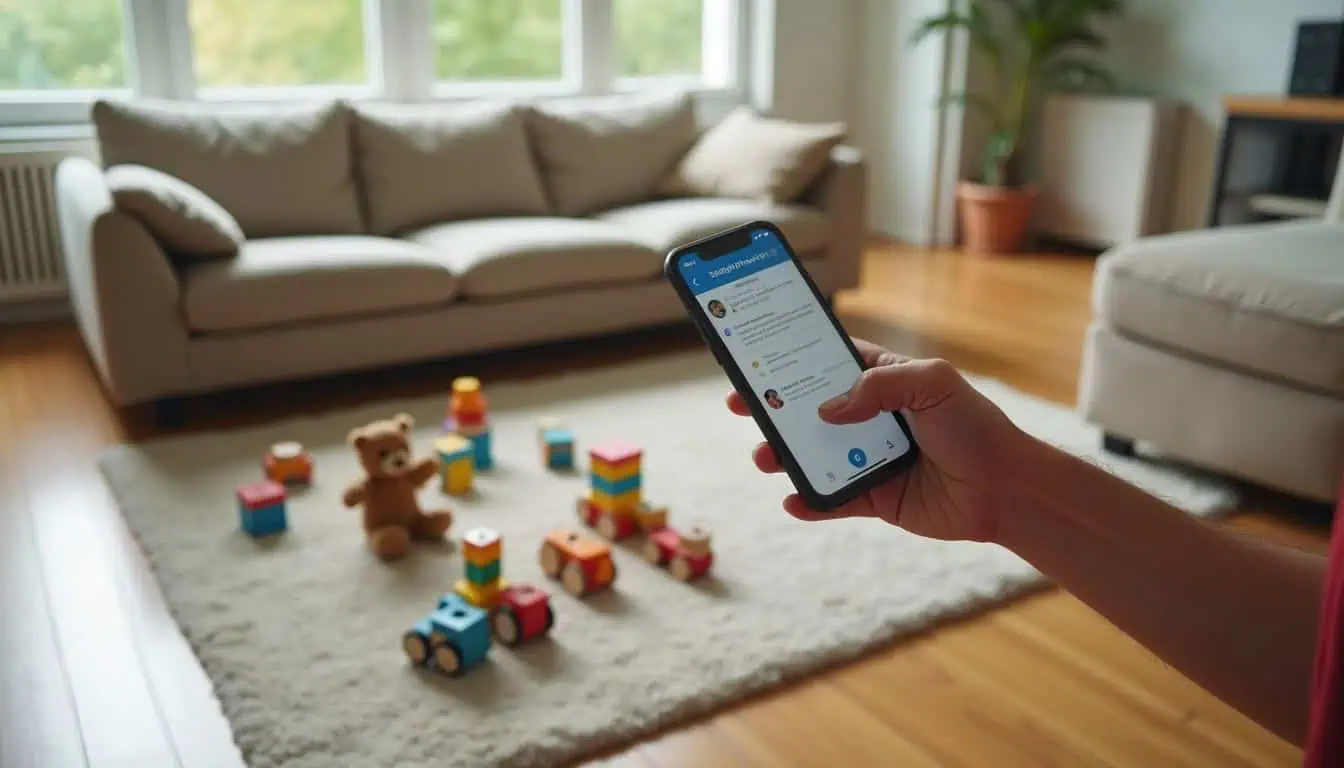
Single dads may see even more support tools and online apps in 2025. Matchmaking platforms could start to focus on single parents, making it easier for single dads to meet childless women who understand their lifestyle.
Video calls might become a first step before meeting up, helping both sides feel safe and comfortable.
Social media will likely play an even bigger part in dating life. Parenting groups or forums can help dads connect with others in the same situation. Child-friendly activities will keep growing as popular date ideas.
These changes aim to make dating less stressful and more honest for everyone involved—kids included.
People Also Ask
What are some real challenges a single dad faces when dating a woman without children?
Single dads often balance parenting with new relationships. They may face time limits, shifting schedules, and loyalty conflicts. Sometimes, the childless partner feels left out or uncertain about her role.
How can a childless woman support her partner who has kids?
She can listen carefully and respect his duties as a father. Patience is key since plans might change quickly. Showing interest in his children helps build trust and connection.
Are there unique rewards for single dads dating women without kids?
Yes, both partners often discover fresh joy together. The dad gets to share parenthood from a new angle while the woman explores family life at her own pace; this opens doors to deep bonds and shared growth.
What should couples discuss before getting serious in this situation?
They should talk about expectations around parenting roles, boundaries with the children, and future goals as a couple; clear communication prevents misunderstandings later on and strengthens their partnership from the start.
References
https://www.millionairematch.com/single-dad-dating-childless-woman
https://thecompanyofdads.com/how-single-dads-manage-custody-schedules/
https://wholeparentbook.com/six-real-benefits-of-dating-a-single-dad/ (2019-03-14)
https://edis.ifas.ufl.edu/publication/HE358
https://wholeparentbook.com/single-dads-next-relationship/
https://fatherhoodchannel.com/2024/08/21/dating-tips-for-single-dads-balancing-fatherhood-and-finding-love/ (2024-08-21)
https://www.numberanalytics.com/blog/coparenting-dynamics-child-outcomes
https://www.gentrylawfirmgeorgia.com/navigating-co-parenting-common-pitfalls-and-how-to-avoid-them-1
https://www.quiz-maker.com/cp-np-emotional-needs-question
https://www.datingbyblaine.com/guides/dating-as-a-single-dad

